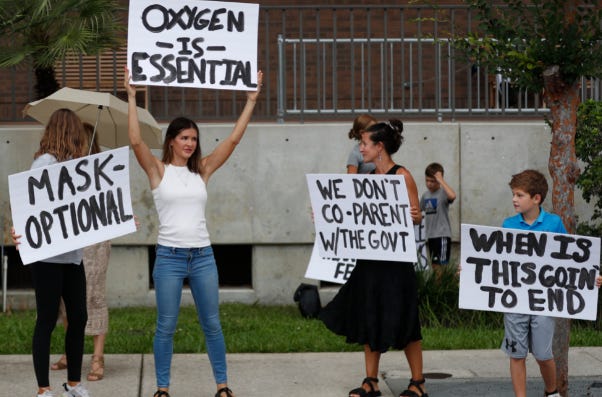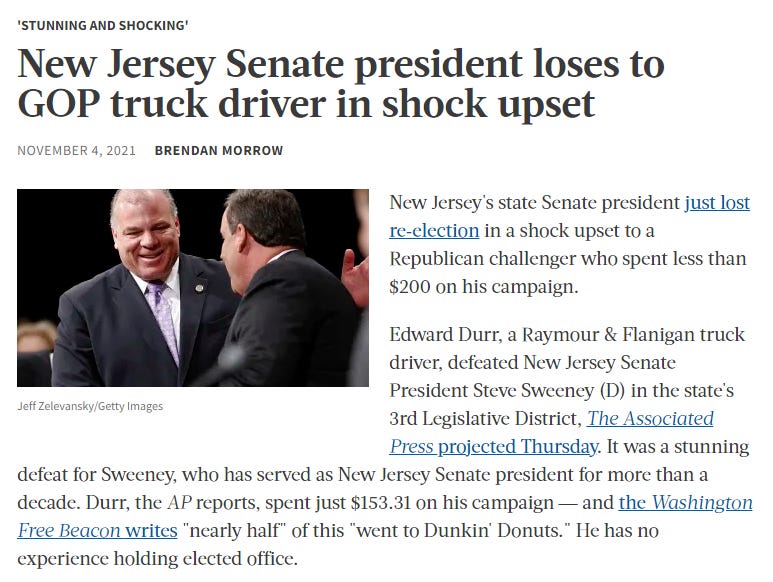Source: Zero Hedge
Submitted by QTR’s Fringe Finance
This is Part 2 of an exclusive interview with Chris DeMuth, Jr., who founded Rangeley Capital, an event driven hedge fund in Connecticut. Part 1 of this interview was published yesterday and be read here.
Rangeley’s strategy is to invest in mispriced securities with limited downsides and corporate events that unlock shareholder value. He also hosts Sifting the World, Seeking Alpha’s SPAC and event driven research product. In his spare time, he climbs mountains.
QTR’s Note: Chris is one of the smartest people I’ve had the chance to meet during my tenure as an investor. He was one of the first people to ever take a phone call from me in the early 2010’s when I first started looking at the Questcor/Acthar scam. He was also one of the first people to be nice to me when I got my start on Seeking Alpha back about 10 years ago and is also widely respected by many people whose work I admire and follow.
All answers are opinion only and do not constitute investment recommendations.

Q: Where are the areas of systemic risk in a global economy backed by limitless fiat?
Rebellion? Limitless fiat has proved to be highly regressive.
It has been great for the owners of assets that have been inflated, especially wealthy, sophisticated, connected ones with access to complex tools to leverage inflating assets.
It has been hell for regular people who earn wages that get deposited into savings accounts.
How would you characterize our government’s response to Covid? What do you foresee them doing going forward and how will that effect markets into 2022?
There were serious real-time risks and uncertainties early in the pandemic, but once most people had access to the vaccines, the imminent crisis of overwhelmed hospitals and mass deaths of otherwise young, healthy people not otherwise close to death was over.
After that point, the cure became worse than the disease. Our government’s response to Covid became out of step with regular people’s priorities – wherein Covid is an important thing but needs to be balanced along with thousands of other things. Much like with monetary policy, my preference for public health policy when facing a crisis is symmetry.

Put a policy in place for a reason then remove it when that reason is gone. But in practice, they seem to pounce on a crisis then just stay fixated on that one response long after its time has passed.
What I foresee going forward is a government clinging white knuckled to a crisis response when regular people would far prefer to simply stay home for a few days if they’re sick and get on with their lives if they’re not. Instead of safety maximalism, they would prefer to balance risks and rewards in a world where other priorities such as business, school, and a full reopening for people without comorbidities (who have never been at much risk and have been in even less risk after vaccines) or others that simply want to make their own health decisions.
How will this affect markets into 2022?
The government reaction will cause far more economic harm than the virus ever did and that will be clear from the state-level data where state-by-state policy differences will show that aggressive lockdowns didn’t do much for public health but did terrible things to state economies. And it could lead to a zany mid-term congressional election.
2021 was a little glimmer, with a few quirks such as a Raymond & Flanigan truck driver spending $153.31 (nearly half of which he spent at Dunkin’ Donuts) on a campaign to unseat New Jersey’s six-term Senate president.

In 2022, we could see dozens or hundreds of such stories at the state and federal level. I love divided government for markets, so ultimately a popular backlash against Covid hysteria could be a great thing for markets and for the country.
Broadly, what’s your outlook on commodities here? Beginning of a super-cycle or time to cool off? Any favorites?
We are pretty bullish on commodities, although we tend to invest indirectly through equities. It could be the beginning of a super-cycle. Most of our commodity exposure is in oil and uranium.
What about your portfolio today looks different than it did a year ago?
We have grown wary of US regulatory risk to a degree that we weren’t a year ago and so are more or less on the sidelines when it comes to announced M&A deals. Instead of owning a basket of merger arbitrage spreads, we are doing deal research but planning to build a portfolio of broken arbitrage situations, either terminated deals where arbs often sell price-insensitively driving prices beneath their standalone values or deals facing antitrust lawsuits that we expect could do better in front of judges than in front of the fanatics running today’s antitrust agencies.
What are the odds the entire global economy is going to need the “great reset” that everyone talks about? How will this happen?
I listened with interest to the World Economic Forum’s Klaus Schwab’s ideas, since taken up by others, in the great reset. Switch private property owned by shareholders to control by “stakeholders”. Emphasize ESG (while, as far as I can tell, 100% ignoring governance and just focusing on environmental and social issues). Focus on the “Fourth Industrial Revolution” of interconnectivity and smart automation.
Every syllable of this sounds like bullshit, and quite similar bullshit to the bullshit they were promoting before it was packaged as a “great reset”. When someone looks at your private property and starts talking about its “stakeholders”, cover up your wallet and prepare to defend yourself. Caring for the environment and social issues are nice, but these are mostly personal virtues – like washing your hands after using the bathroom. I’m all for it, but one can just do it without making a big deal of it in public. And robots are cool, but we’re probably over- not under- invested in 3-d printing and whatnot. It mostly fits in the WEF framework because the full relevance of such technology is still pretty unfalsifiable, so it lets blowhards sound profound without ever risking being wrong.
Finally – are you a dove or a hawk when it comes to China? Why or why not?
Short-term, the US and China can help each other more than we can hurt, so the US public and private sectors has largely accommodated themselves to and even assisted with the PRC’s human rights abuses, censorship, and mass surveillance. But I take each step that Xi Jinping takes towards greater authoritarianism at home and assertiveness abroad at face value.
He was able to have his way with Hong Kong and is having his way with the South China Sea. He probably anticipates having his way with Taiwan, too, and it is doubtful that anything he sees from the US would dissuade him from trying. Throughout his career, Xi has called his shots and has been quite consistent with doing what he said he’d do. And Taiwan is on his list.
Thanks, Chris.
Part 1 of this interview is here.
—
SUBSCRIBE: Zerohedge readers always get a 20% discount. To subscribe and gain access to all my archives, as well as support my work, use this link for 20% off: Get 20% off forever,

My Disclaimer: I own ARKK puts and nominal positions in GBTC, TLT and SI. I may add any name mentioned in this article and sell any name mentioned in this piece at any time. None of this is a solicitation to buy or sell securities. These positions can change immediately as soon as I publish this, with or without notice. You are on your own. Do not make decisions based on my blog. I exist on the fringe. The publisher does not guarantee the accuracy or completeness of the information provided in this page. These are not the opinions of any of my employers, partners, or associates. I get shit wrong a lot.
Chris DeMuth’s Disclaimer: I have a beneficial long position in bitcoin and am short ARKK, ARKG, ARKW, ARKQ, and ARKF either through stock ownership, options, or other derivatives. Additional legal disclosures here for anyone really into that kind of thing; short version: think for yourself.


